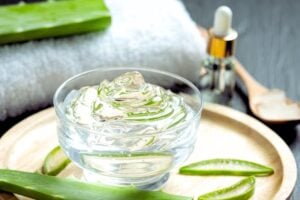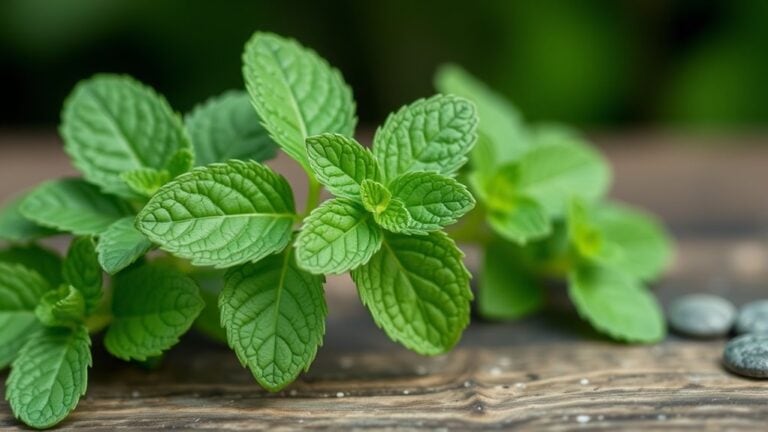Aloe vera is a popular ingredient in many skin care products due to its numerous benefits for the skin. It has been used for centuries to soothe and heal various skin issues, making it a staple in many beauty routines.
Thinking about using aloe vera on your face? In this article, we’ll explore the benefits, how to apply it, and important safety tips. Discover why aloe vera could be a game-changer for your skincare routine.
Key Takeaways
Aloe vera is generally safe for the face but should be patch tested first, especially for sensitive skin, to avoid any adverse reactions.
This plant offers multiple skincare benefits, including moisturizing, reducing acne, soothing irritations, and fading dark spots.
Different skin types can benefit from aloe vera in various ways; apply it as a mask for dry skin, balance oils for oily skin, and use it more liberally on sensitive areas.
Is Aloe Vera Safe for Your Face?
Aloe vera is generally safe for use on the face, thanks to its soothing and hydrating properties, as highlighted by experts like Dr. Mona Foad.
However, it’s crucial to remember that everyone’s skin is different. Before you slather aloe vera gel all over your face, it’s wise to conduct a patch test, especially if you have sensitive skin. This involves applying a small amount of the gel to a discreet area and waiting 24 hours to see if any adverse reactions occur.
While aloe vera is beneficial for most, some individuals may experience skin irritations or allergic reactions. If you notice redness, itching, or any form of discomfort, discontinue use immediately and consult a dermatologist. Your skin’s health is paramount, so caution is advised.
Benefits of Aloe Vera for the Face
Incorporating aloe vera into your skincare routine can be transformative. This versatile plant addresses multiple skin concerns. From moisturizing and hydrating to reducing acne and soothing irritations, aloe vera has you covered.
Here are some specific benefits that make this plant a skincare staple.
Moisturizes and Hydrates the Skin
Aloe vera is an excellent natural moisturizer, particularly for dry and dehydrated skin. The gel from aloe vera is rich in water content, which helps to deeply nourish and hydrate your skin. What makes it even more remarkable is its ability to be easily absorbed, making it suitable for both dry and oily skin types. Whether dealing with dry patches or an oily T-zone, aloe vera balances your skin’s moisture levels effectively.
Its hydrating properties are particularly beneficial for sensitive and reactive skin. The cooling and soothing properties of aloe vera make it ideal for calming irritated or inflamed skin, providing relief from itchy skin and reducing the appearance of fine lines and wrinkles.
For a natural solution to keep your skin plump and hydrated, using aloe vera is ideal.
Reduces Acne and Pimples
Aloe vera excels at reducing acne and pimples. Aloe vera contains salicylic acid, known for its effectiveness in reducing acne outbreaks. This component helps unclog pores and reduce inflammation, making it a powerful ally in the fight against acne.
Aloe vera’s anti-inflammatory and antibacterial properties also play a crucial role in calming irritated or inflamed skin. It helps reduce redness and swelling, promoting a clearer complexion. For those with acne-prone skin, aloe vera can significantly improve your skincare routine.
Soothes Skin Irritations and Burns
Aloe vera is renowned for its soothing properties, particularly when it comes to skin irritations and burns. Aloe vera gel’s cooling effect offers immediate relief from sunburn or minor skin irritations. Whether you’ve spent too much time in the sun or have a minor kitchen burn, aloe vera can come to the rescue.
Aloe vera gel calm irritated or inflamed skin and reduces redness. Its anti-inflammatory and antibacterial properties aid in the wound healing process, making aloe gel an essential ingredient for repairing damaged skin tissue. Aloe vera may be particularly beneficial for those with sensitive skin.
Keep a bottle of pure natural aloe vera gel handy for those unexpected skin emergencies.
Reduces Dark Spots and Hyperpigmentation
Aloe vera can help address dark spots and hyperpigmentation. The application of aloe vera can help in fading scars and dark spots over time. Its healing properties promote a more uniform skin tone by enhancing the skin’s natural healing process.
Aloe vera’s ability to reduce acne and prevent breakouts also contributes to a clearer complexion, free from the marks left by past blemishes. By incorporating aloe vera into your skincare routine, you can work towards achieving a more even and radiant skin tone.
How to Apply Aloe Vera on Your Face
Applying aloe vera on your face is simple, but certain tips can help you maximize its benefits. Start by cutting open a mature leaf from an aloe vera plant and extracting the gel directly from it. For maximum benefits, always opt for fresh gel.
Apply a thin layer of the gel to your face, allowing it to sit for about 20 minutes before rinsing off with lukewarm water. This method ensures your skin absorbs the active components in aloe vera without the excessive stickiness. Conducting a patch test is crucial, especially for sensitive skin.
Best Practices for Different Skin Types
Aloe vera’s versatility allows it to suit different skin types. For dry skin, use aloe vera as a hydrating mask, leaving it on for 15-20 minutes or overnight for deeper moisture. Mixing aloe vera with jojoba or rosehip oil can enhance hydration for very dry skin.
Oily skin benefits from aloe vera’s ability to balance oil production, preventing excess grease without stripping moisture. For sensitive skin, apply aloe vera gel multiple times daily for its calming effects.
Combination skin can be treated by applying aloe vera more generously to dry areas and lighter on oily zones. If you have acne-prone skin, combining aloe vera with tea tree oil can offer targeted treatment for blemishes.
Potential Risks and Side Effects
Though generally safe, topical use of aloe vera can have potential risks and side effects. Some individuals may experience skin irritation, including redness, burning, or itching. If you observe any of these symptoms, discontinue use immediately and consult a dermatologist.
Here are some common symptoms of an aloe vera allergy:
Skin rash
Itchiness
Respiratory issues in severe cases
Individuals allergic to other members of the Liliaceae family may have a higher likelihood of reacting to aloe vera. Conducting a patch test and exercising caution is crucial, particularly for sensitive skin or existing conditions.
Comparing Aloe Vera with Other Skincare Ingredients
Aloe vera is notable for its anti-inflammatory, antibacterial, and wound-healing properties. While hyaluronic acid is excellent for attracting and retaining moisture, aloe vera offers a broader range of benefits, including cooling and soothing the skin.
Cucumber extract is another popular ingredient known for its cooling and hydrating benefits, similar to aloe vera. However, aloe vera’s unique combination of healing properties makes it a more versatile option for various skin concerns.
Incorporating Aloe Vera into Your Skincare Routine
Incorporating aloe vera into your skincare routine is both simple and effective. Use aloe vera gel as a moisturizer after cleansing to retain hydration and soothe irritation. Pairing aloe vera gel with vitamin C serums can enhance its brightening effects, targeting dark spots and uneven skin tone.
Many skincare brands offer specialized aloe vera products, including hydrating gels, resurfacing pads, and masks. Always choose products with high concentrations of aloe vera to maximize benefits. Aloe vera gel can also serve as a gentle makeup remover, cleansing the skin while providing nourishment.
DIY Aloe Vera Face Masks
Making aloe vera face masks at home is a fun and effective way to pamper your skin. A simple mask can be made by blending aloe vera gel with honey, which acts as a natural humectant to hydrate the skin. For a refreshing mask, mix aloe vera with cucumber to cool and hydrate, especially beneficial during hot weather.
If you’re dealing with acne, combine aloe vera gel with tea tree oil for its antibacterial properties. To exfoliate, mix aloe vera gel with sugar to remove dead skin cells and reveal a brighter complexion. Experiment with different natural ingredients to find the perfect mask for your skin’s needs.
Frequently Asked Questions
Is aloe vera safe for sensitive skin?
Absolutely, aloe vera can be safe for sensitive skin, but be sure to do a patch test first to avoid any reactions.
How often should I use aloe vera on my face?
You can safely use aloe vera on your face every day as a moisturizer, spot treatment, or in a DIY mask. It’s a gentle option that’s great for your skin!
Can aloe vera help with acne scars?
Absolutely! Aloe vera can promote skin healing and gradually help fade those acne scars.
What’s the best way to apply fresh aloe vera gel?
The best way to apply fresh aloe vera gel is to spread a thin layer on your face, let it sit for about 20 minutes, and then rinse it off with lukewarm water for refreshing results.
Are there any side effects of using aloe vera on the face?
Yes, some people might experience skin irritation or allergic reactions when using aloe vera on their face. If you notice any redness, itching, or discomfort, it’s best to stop using it.





